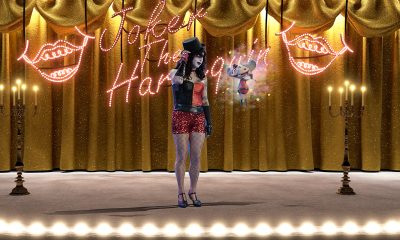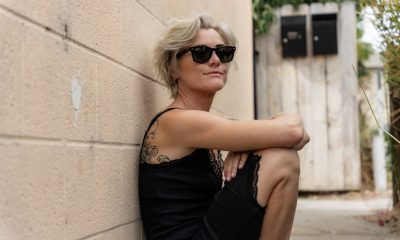a&e features
Character actor Leslie Jordan on his pony obsession, TV hits and misses and his dream threesome
‘Will & Grace’ actor returns to D.C. for Pride-week standup show June 5
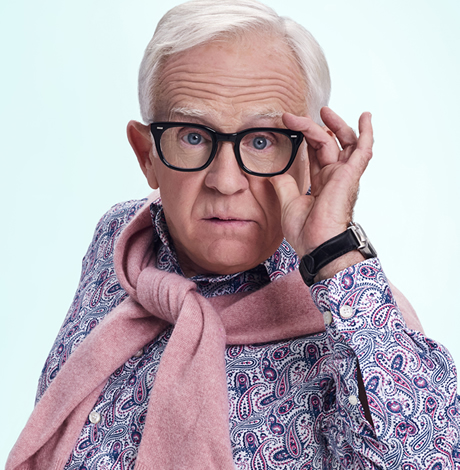
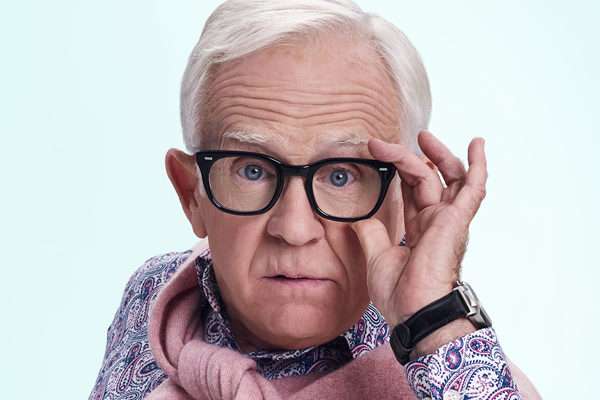
Washington Blade presents:
Leslie Jordan EXPOSED
Wednesday, June 5
7 (sold out) and 9 p.m.
Union Stage
740 Washington St., S.W.
$45 ($60 with meet and greet)
Actor/comedian Leslie Jordan returns to Washington for another Blade-sponsored stand-up show Wednesday, June 5. The “Sordid Lives”/“Will & Grace” Southern sissy spoke by phone two weeks ago from his Los Angeles home.
He doesn’t wait for a question — just starts things off with some bad news.
LESLIE JORDAN: I got this television series, which by the way, got canceled today.
WASHINGTON BLADE: Ohhhh
JORDAN: I’m gutted
BLADE: I’m so sorry.
JORDAN: I don’t care so much except the money was so good. I really liked that. I’m sure other things will come along, but it’s a political move. Twentieth Century Fox was bought by Disney and this new guy came in and it was really weird, he picked up only really dramas. And guess what’s going on in our place? (“WWE) SmackDown,” that wrestling show.
BLADE: How did you hear?
JORDAN: (Series creator) Charlie (Day) called me, who’s just so adorable. He did “It’s Always Sunny in Philadelphia,” he created the series and wrote it. First he sent me an e-mail and said, “Be ready because it’s probably going to happen.” Then he called us each personally which I thought was very sweet. … I don’t know, there’s a chance it could be picked up by another network so you just roll with the flow.
BLADE: How did you like working with (“Cool Kids” co-star) Vicki (Lawrence)?
JORDAN: We glommed on to one another from the moment we met. We’d met at the airport before in Puerto Vallarta and she said, “Oh, I remember,” and I thought, “She doesn’t remember me.” (Laughs) She was my best friend and is my best friend still. She’s more upset about it than I am, I think. But yeah, we got along so well. She’s exactly like you think she would be. It was so interesting on that show because all four of us (Jordan and Lawrence co-starred with David Alan Grier and Martin Mull) had such history in the industry. … It was kind of a companion piece to Tim Allen’s show (“Last Man Standing”) and I always forget, he’s just rabidly Republican so it’s a very conservative audience and we followed them with all kinds of shenanigans. We had gay people, gay people kissing.
BLADE: How did you feel it was going?
JORDAN: Well I knew there were some problems with the direction only because the network was there so much and I kind of thought at first well, maybe it’s because it’s a new show but oh my god, we would have rewrites right up until and even in front of our audience. But they did that on “Will & Grace” too, so I didn’t think that much about it. But then I think Charlie Collier, who’s the new person at Fox, he wanted to put his own stamp on things, so there’s that. I don’t think we did anything bad or wrong.
BLADE: How long is it usually in sitcoms from the night you tape until it airs?
JORDAN: The rule of thumb is you want about five in the can but we didn’t shoot in the same order they aired. We try to stay about five ahead so you can gauge the audience reaction. It’s a really interesting process for me, ‘cause I’ve been on other shows from the beginning but not where I was one of the lead lead leads.
BLADE: Do you prefer sitcoms to single camera?
JORDAN: My schedule on “Cool Kids” was the easiest schedule I ever have. You know, on “American Horror Story,” we did like 14-hour days. And we’d have big stars like Lady Gaga who could only give us one day so we had to get all her stuff in. That’s the difference between multi-cam, which was “The Cool Kids.” We’d be out in the woods in Malibu trying to make it look like it was Virginia. I don’t know how those people like (“American Horror Story” mainstay) Sarah Paulson do it. She’s such a trooper. She’s been doing it for years, all these 14-hour days. I don’t know how they do it.
BLADE: What do you do when you have downtime between shots?
JORDAN: I’m a big napper, which is funny because I don’t nap at home. Or I like to watch. I don’t mind sitting there on the set watching the other actors. I’d rather do that than sit in my trailer. I know people who watch TV, read a book. I read, but mostly on my way to work. And of course I’m a big yapper. Sometimes I have to go to my trailer because I just talk until I’m exhausted.
BLADE: Have you ever seen one of those big reclining boards they have on sets?
JORDAN: The only time I’ve ever seen that was on “The Help,” of all places. I haven’t done many costume dramas but on “The Help,” they had Jessica Chastain, who was kind of unknown then, I mean she’d done a couple movies, but she wasn’t anything like she is now, they had her in this gorgeous dress and she requested that. She couldn’t sit down so they just hung her up there like a bat. But yeah, it’s like a board where you have to put your arms up. I said, “You look so pretty hanging there.” She said, “I don’t want to wrinkle my dress.” I said, “God, you’re a trooper.” I’d wrinkle that dress, I couldn’t care less. Make ‘em steam it. (laughs)
BLADE: Have you ever spilled something just before a shot?
JORDAN: A hundred times. I’ll tell you what the worst is, you have to go pee real fast and you say, “I’ll be back in two seconds,” then you dribble. Then everybody’s looking and they take a hair dryer out (laughs). But I’m notorious. At lunch break when I’m on these shows, the costumers will come take my clothes off and put me in a T-shirt because I’m just notorious. When I was a little boy, I’d come home and my mom would say, “Oh, spaghetti, green beans …,” she knew everything I’d had because it was all over me.
BLADE: Tell us about your new live show.
JORDAN: I’m so proud of it, I think it’s the best of all my shows. I tell about each of my previous ones and within the journey of telling about all that and how it was when I first got to Hollywood, this wonderful kind of journey comes out about acceptance. I’m really proud of it. The last time I was in D.C. was the weekend of that devastating occurrence at the club in Orlando, you remember that? Oh honey, it was Pride weekend but that Sunday morning I was taken to the White House, they invited me, the Washington gay choir and Ty Herndon was there, because our ex-president and his lovely first lady wanted a gay presence there so I have this wonderful story and I end the show telling about that weekend.
BLADE: You were in our parade three years ago, and threw the first pitch at Night OUT plus your show. How was D.C. for you last time?
JORDAN: It was wonderful. The only thing was I wanted to ride a pony and they thought I was kidding. I showed up in my riding gear. I said, “Where’s the pony,” they said, “Oh we thought you were kidding.” I said, “Does it look like I’m kidding?” So I went to Kinkos and made a little sign that said, “I was promised a pony.” If you look at the pictures, it’s me in the back of a car in a riding outfit. Nobody knew what the fuck was going on.
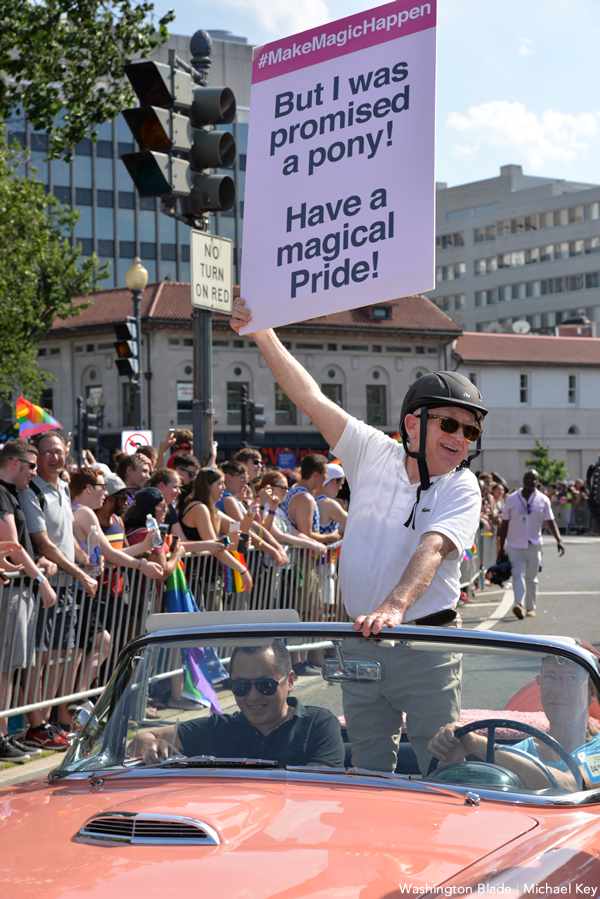
BLADE: Have you done many Pride events?
JORDAN: So many over the years, I love it. I’ve been the grand marshal I can’t even tell you how many times. My favorite was years ago in Nashville, this was like 20 years ago. I said, “Y’all must be brave in Nashville, Tennessee, with all those rednecks,” and they said, “We do have a wonderful parade. It’s nothing like y’all get in L.A. It’s mainly a baton-twirling sissy and two lesbians.” I thought, “Well, that’s all you need for a parade — a baton-twirling sissy and two lesbians.” (laughs)
BLADE: Are you staying for the parade this year?
JORDAN: No, I have to get back to L.A. because I’m hosting an Actors Fund event for Lily Tomlin the night of the Tonys.
BLADE: Last time we talked you said things had dried up after you won your Emmy and that’s what led to your stage show, but lately you’ve been doing a lot of TV. How did you get hot again?
JORDAN: Well I’ve been able to balance the two really, really well. The TV stuff, I have no control over. It truly is just things falling into my lap but I have to be available for it. The year before we did “Cool Kids” (2017) I did 44 venues, which I love because of the immediate response of the audience. But you have to balance it because all the money’s in TV, you just can’t beat the money so that allows me to go on the road and I do really well. … Now to have done a full year on a show, that’s got to help my TV profile. Something’s gotta give here. I’m 64, I’ve been at it a long time. If you can get a series on the air for about four seasons, you’re set. It’s all gravy from there. But they’ve already called me for “Will & Grace” next season, they want to book me again for that. In a way I’ve done everything I really set out to do, so from here on out it’s all just fun.
BLADE: How many “Will & Grace” episodes have you done since it came back?
JORDAN: Let me see, I’ve done three. One was a Christmas episode where you barely saw me but then I did a hilarious one last season where they named the wall after me because I gave so much money to the Republican party and then Karen wants her name on the wall and we got rolled over to Mexico and put in those cages (laughs). But anyway, it was wonderful. But (co-creator) Max (Mutchnick) had called me and asked if I wanted to come back. I said, “Of course, but you killed me.” He said, “Don’t worry, we’ll figure something out,” so they ended up just kind of dropping that finale because it was just too much going on there. I didn’t do the first one, they were already like five in by the time I was there so they’d had their little reunion, but … Megan Mullally gave me the sweetest compliment. She said, “I never lost Karen Walker, but tonight bantering with you, I believe Karen Walker is truly back.” I thought that was sweet.
BLADE: What do you think of this trend of rebooting so many classic shows? Especially the ones like “Dynasty” or “MacGyver” they do with new casts?
JORDAN: I wonder why with all these platforms now, people aren’t open to new ideas. It’s harder now. My friend Del Shores and I come up with these ideas all the time and go to pitch’ em and they just stare at us. Maybe we’re just too old and it’s just kids running the shows now. Of course, you wanna bring stuff back but it gets a little ridiculous after a while.
BLADE: What’s something you like and don’t like about the way the industry has evolved in let’s say the last 10 years or so?
JORDAN: I like the way in which gay characters are portrayed, I really like that. It’s been a long journey since I got here in 1982. It was very wink-wink. You’d go out at night to the gay bars and see every producer and casting director in town, then you’d see them on the job and it was very wink-wink, very different than it is today. What I don’t like about the industry today is there seems to be no sense of history. I got so upset the other day because somebody online, a TV critic, called our show “The Cool Kids” a snoozefest and I wanted to write him and say I would love for you to come to 20th Century Fox to stage 17 and see the 80-odd people who come in sometimes at 4 o’clock in the morning to create this snoozefest. The four leads on that show have more combined TV history than you would if you worked the rest of you entire life. It’s so casual and easy to critique and everybody’s a critic now. I wanted to say, “Young man, you need to respect your elders.” (laughs)
BLADE: Last time we talked you were excited about having lost weight. Have you kept it off?
JORDAN: No, I’m fat as a pig. I went over to the equestrian center, I wanted to ride a pony, they have a beautiful pony there, and they said, “No, you’re too fat.” I gained more weight on this “Cool Kids,” but no, I’m gonna try to get it off. But I’m not trim at all. I’m as big as Dallas and half of Fort Worth.
BLADE: What happened?
JORDAN: The catering on “The Cool Kids” was ridiculous. They’d come to me and say, “Leslie, there’s this little Asian lady over there cooking rice balls,” and I’d go, “We just had tacos.” It was like being in a food mall. The food was constant, so I’ve got to get that off. I mean I’m not fat, fat. I’ve gained about eight pounds, but on me, I’m like a little beach ball with arms.
BLADE: Who’s your dream threesome?
JORDAN: I think Eddie Redmayne is adorable. Oh, I don’t know, I’m so old I don’t even think about that anymore (laughs). My biggest crush has always been Mark Harmon. I’ve known him 20-30 years and he just gets better and better looking. Same with George Clooney. I did a series with George a hundred years ago. So that’s a funny threeway — Mark Harmon, Leslie Jordan and George Clooney.
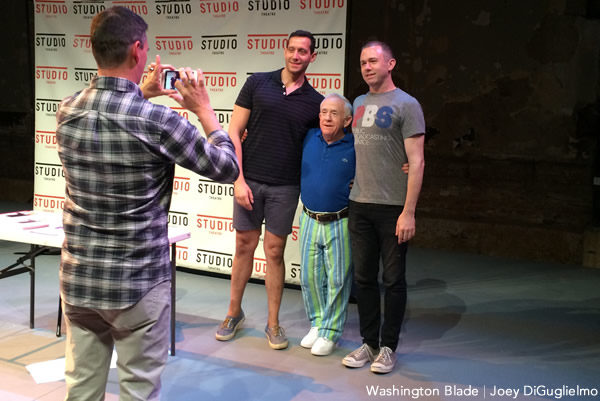
a&e features
Eastern Shore chef named James Beard Finalist
Harley Peet creates inventive food in an inclusive space

In a small Eastern Shore town filled with boutiques, galleries, and the occasional cry of waterfowl from the Chesapeake, Chef Harley Peet is most at home. In his Viennese-inflected, Maryland-sourced fine-dining destination Bas Rouge, Peet draws from his Northern Michigan upbringing, Culinary Institute of America education, and identity as a gay man, for inspiration.
And recently, Peet was named a James Beard Finalist for Best Chef: Mid-Atlantic – the first “Best Chef: Mid-Atlantic” finalist representing the Eastern Shore.
Peet, after graduation from the Culinary Institute of America, took a position as sous chef at Tilghman Island Inn, not far from Bas Rouge. Falling in love with the Eastern Shore, he continued his passion for racing sailboats, boating, gardening, and fishing, and living his somewhat pastoral life as he opened Bas Rouge in 2016 as head chef, a restaurant part of the Bluepoint Hospitality group, which runs more than a dozen concepts in and around Easton, Md.
Coming from a rural area and being gay, Peet knew he had his work cut out for him. He was always aware that the service and hospitality industry “can be down and dirty and rough.”
Now as a leader in the kitchen, he aims to “set a good example, and treat people how I want to be treated. I also want to make sure if you’re at our establishment, I’m the first to stand up and say something.”
The Bas Rouge cuisine, he says, is Contemporary European. “I’m inspired by old-world techniques of countries like Austria, Germany, and France, but I love putting a new spin on classic dishes and finding innovative ways to incorporate the bounty of local Chesapeake ingredients.”
His proudest dish: the humble-yet-elevated Wiener Schnitzel. “It is authentic to what one would expect to find in Vienna, down to the Lingonberries.” From his in-house bakery, Peet dries and grinds the housemade Kaiser-Semmel bread to use as the breadcrumbs.
Peet works to support the LGBTQ community inside and outside of the kitchen. “I love that our Bluepoint Hospitality team has created welcoming spaces where our patrons feel comfortable dining at each of our establishments. Our staff have a genuine respect for one another and work together free of judgment.”
Representing Bluepoint, Peet has participated in events like Chefs for Equality with the Human Rights Campaign, advocating for LGBTQ rights.
At Bas Rouge, Peet brings together his passion for inclusion steeped in a sustainability ethic. He sees environmental stewardship as a way of life. Peet and his husband have lived and worked on their own organic farm for several years. Through research in Europe, he learned about international marine sourcing. Witnessing the impacts of overfishing, Peet considers his own role in promoting eco-friendly practices at Bas Rouge. To that end, he ensures responsible sourcing commitments through his purveyors, relationships that have helped create significant change in how people dine in Easton.
“I have built great relationships in the community and there’s nothing better than one of our long-standing purveyors stopping in with a cooler of fresh fish from the Chesapeake Bay. This goes especially for catching and plating the invasive blue catfish species, which helps control the species’ threat to the local ecosystem.
Through his kitchen exploits, Peet expressed a unique connection to another gay icon in a rural fine-dining restaurant: Patrick O’Connell, of three Michelin starred Inn at Little Washington. In fact, Peet’s husband helped design some of O’Connell’s kitchen spaces. They’ve both been able to navigate treacherous restaurant-industry waters, and have come out triumphant and celebrated. Of O’Connell, Peet says that he “sees [his restaurants] as canvas, all artistry, he sees this as every night is a show.” But at the same time, his “judgment-free space makes him a role model.”
Being in Easton itself is not without challenges. Sourcing is a challenge, having to either fly or ship in ingredients, whereas urban restaurants have the benefit of trucking, he says. The small town “is romantic and charming,” but logistics are difficult – one of the reasons that Peet ensures his team is diverse, building in different viewpoints, and also “making things a hell of a lot more fun.”
Reflecting on challenges and finding (and creating) space on the Eastern Shore, Peet confirmed how important it was to surround himself with people who set a good example, and “if you don’t like the way something is going … move on.”
a&e features
What to expect at the 2024 National Cannabis Festival
Wu-Tang Clan to perform; policy discussions also planned

(Editor’s note: Tickets are still available for the National Cannabis Festival, with prices starting at $55 for one-day general admission on Friday through $190 for a two-day pass with early-entry access. The Washington Blade, one of the event’s sponsors, will host a LGBTQIA+ Lounge and moderate a panel discussion on Saturday with the Mayor’s Office of LGBTQ Affairs.)
With two full days of events and programs along with performances by Wu-Tang Clan, Redman, and Thundercat, the 2024 National Cannabis Festival will be bigger than ever this year.
Leading up to the festivities on Friday and Saturday at Washington, D.C.’s RFK Stadium are plenty of can’t-miss experiences planned for 420 Week, including the National Cannabis Policy Summit and an LGBTQ happy hour hosted by the District’s Black-owned queer bar, Thurst Lounge (both happening on Wednesday).
On Tuesday, the Blade caught up with NCF Founder and Executive Producer Caroline Phillips, principal at The High Street PR & Events, for a discussion about the event’s history and the pivotal political moment for cannabis legalization and drug policy reform both locally and nationally. Phillips also shared her thoughts about the role of LGBTQ activists in these movements and the through-line connecting issues of freedom and bodily autonomy.
After D.C. residents voted to approve Initiative 71 in the fall of 2014, she said, adults were permitted to share cannabis and grow the plant at home, while possession was decriminalized with the hope and expectation that fewer people would be incarcerated.
“When that happened, there was also an influx of really high-priced conferences that promised to connect people to big business opportunities so they could make millions in what they were calling the ‘green rush,'” Phillips said.
“At the time, I was working for Human Rights First,” a nonprofit that was, and is, engaged in “a lot of issues to do with world refugees and immigration in the United States” — so, “it was really interesting to me to see the overlap between drug policy reform and some of these other issues that I was working on,” Phillips said.
“And then it rubbed me a little bit the wrong way to hear about the ‘green rush’ before we’d heard about criminal justice reform around cannabis and before we’d heard about people being let out of jail for cannabis offenses.”
“As my interests grew, I realized that there was really a need for this conversation to happen in a larger way that allowed the larger community, the broader community, to learn about not just cannabis legalization, but to understand how it connects to our criminal justice system, to understand how it can really stimulate and benefit our economy, and to understand how it can become a wellness tool for so many people,” Phillips said.
“On top of all of that, as a minority in the cannabis space, it was important to me that this event and my work in the cannabis industry really amplified how we could create space for Black and Brown people to be stakeholders in this economy in a meaningful way.”

“Since I was already working in event production, I decided to use those skills and apply them to creating a cannabis event,” she said. “And in order to create an event that I thought could really give back to our community with ticket prices low enough for people to actually be able to attend, I thought a large-scale event would be good — and thus was born the cannabis festival.”
D.C. to see more regulated cannabis businesses ‘very soon’
Phillips said she believes decriminalization in D.C. has decreased the number of cannabis-related arrests in the city, but she noted arrests have, nevertheless, continued to disproportionately impact Black and Brown people.
“We’re at a really interesting crossroads for our city and for our cannabis community,” she said. In the eight years since Initiative 71 was passed, “We’ve had our licensed regulated cannabis dispensaries and cultivators who’ve been existing in a very red tape-heavy environment, a very tax heavy environment, and then we have the unregulated cannabis cultivators and cannabis dispensaries in the city” who operate via a “loophole” in the law “that allows the sharing of cannabis between adults who are over the age of 21.”
Many of the purveyors in the latter group, Phillips said, “are looking at trying to get into the legal space; so they’re trying to become regulated businesses in Washington, D.C.”
She noted the city will be “releasing 30 or so licenses in the next couple of weeks, and those stores should be coming online very soon” which will mean “you’ll be seeing a lot more of the regulated stores popping up in neighborhoods and hopefully a lot more opportunity for folks that are interested in leaving the unregulated space to be able to join the regulated marketplace.”
National push for de-scheduling cannabis
Signaling the political momentum for reforming cannabis and criminal justice laws, Wednesday’s Policy Summit will feature U.S. Sens. Raphael Warnock (D-Ga.), Jeff Merkley (D-Ore.), Elizabeth Warren (D-Mass.), and Chuck Schumer (D-N.Y.), the Senate majority leader.
Also representing Capitol Hill at the Summit will be U.S. Congresswoman Eleanor Holmes Norton (D-D.C.) and U.S. Reps. Earl Blumenauer (D-Ore.) and Barbara Lee (D-Calif.) — who will be receiving the Supernova Women Cannabis Champion Lifetime Achievement Award — along with an aide to U.S. Rep. David Joyce (R-Ohio).
Nationally, Phillips said much of the conversation around cannabis concerns de-scheduling. Even though 40 states and D.C. have legalized the drug for recreational and/or medical use, marijuana has been classified as a Schedule I substance since the Controlled Substances Act was passed in 1971, which means it carries the heftiest restrictions on, and penalties for, its possession, sale, distribution, and cultivation.
The U.S. Department of Health and Human Services formally requested the drug be reclassified as a Schedule III substance in August, which inaugurated an ongoing review, and in January a group of 12 Senate Democrats sent a letter to the Biden-Harris administration’s Drug Enforcement Administration urging the agency to de-schedule cannabis altogether.
Along with the Summit, Phillips noted that “a large contingent of advocates will be coming to Washington, D.C. this week to host a vigil at the White House and to be at the festival educating people” about these issues. She said NCF is working with the 420 Unity Coalition to push Congress and the Biden-Harris administration to “move straight to de-scheduling cannabis.”
“This would allow folks who have been locked up for cannabis offenses the chance to be released,” she said. “It would also allow medical patients greater access. It would also allow business owners the chance to exist without the specter of the federal government coming in and telling them what they’re doing is wrong and that they’re criminals.”
Phillips added, however, that de-scheduling cannabis will not “suddenly erase” the “generations and generations of systemic racism” in America’s financial institutions, business marketplace, and criminal justice system, nor the consequences that has wrought on Black and Brown communities.
An example of the work that remains, she said, is making sure “that all people are treated fairly by financial institutions so that they can get the funding for their businesses” to, hopefully, create not just another industry, but “really a better industry” that from the outset is focused on “equity” and “access.”
Policy wonks should be sure to visit the festival, too. “We have a really terrific lineup in our policy pavilion,” Phillips said. “A lot of our heavy hitters from our advocacy committee will be presenting programming.”
“On Saturday there is a really strong federal marijuana reform panel that is being led by Maritza Perez Medina from the Drug Policy Alliance,” she said. “So that’s going to be a terrific discussion” that will also feature “representation from the Veterans Cannabis Coalition.”
“We also have a really interesting talk being led by the Law Enforcement Action Partnership about conservatives, cops, and cannabis,” Phillips added.
Cannabis and the LGBTQ community
“I think what’s so interesting about LGBTQIA+ culture and the cannabis community are the parallels that we’ve seen in the movements towards legalization,” Phillips said.
The fight for LGBTQ rights over the years has often involved centering personal stories and personal experiences, she said. “And that really, I think, began to resonate, the more that we talked about it openly in society; the more it was something that we started to see on television; the more it became a topic in youth development and making sure that we’re raising healthy children.”
Likewise, Phillips said, “we’ve seen cannabis become more of a conversation in mainstream culture. We’ve heard the stories of people who’ve had veterans in their families that have used cannabis instead of pharmaceuticals, the friends or family members who’ve had cancer that have turned to CBD or THC so they could sleep, so they could eat so they could get some level of relief.”
Stories about cannabis have also included accounts of folks who were “arrested when they were young” or “the family member who’s still locked up,” she said, just as stories about LGBTQ people have often involved unjust and unnecessary suffering.
Not only are there similarities in the socio-political struggles, Phillips said, but LGBTQ people have played a central role pushing for cannabis legalization and, in fact, in ushering in the movement by “advocating for HIV patients in California to be able to access cannabis’s medicine.”
As a result of the queer community’s involvement, she said, “the foundation of cannabis legalization is truly patient access and criminal justice reform.”
“LGBTQIA+ advocates and cannabis advocates have managed to rein in support of the majority of Americans for the issues that they find important,” Phillips said, even if, unfortunately, other movements for bodily autonomy like those concerning issues of reproductive justice “don’t see that same support.”
a&e features
Juliet Hawkins’s music defies conventional categorization
‘Keep an open mind, an open heart, and a willingness to evolve’
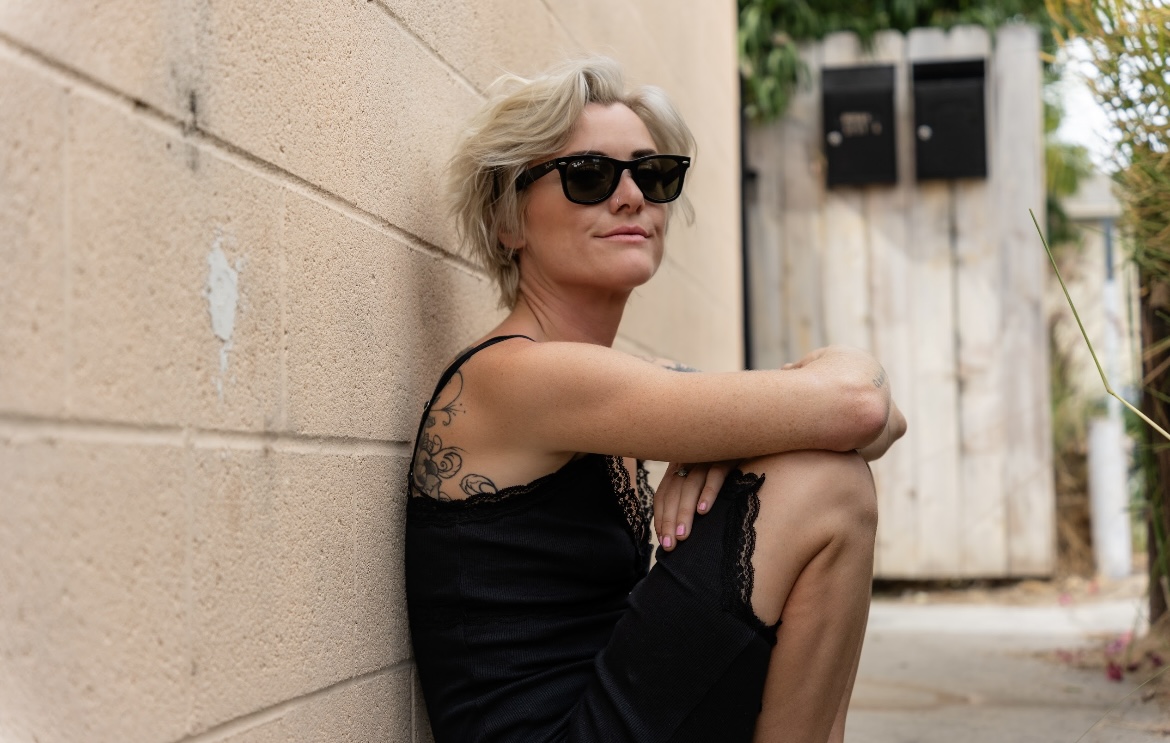
LONG BEACH, Calif. – Emerging from the dynamic music scene of Los Angeles, Juliet Hawkins seamlessly integrates deeply soulful vocals with contemporary production techniques, crafting a distinctive sound that defies conventional categorization.
Drawing inspiration from the emotive depth of Amy Winehouse and weaving together elements of country, blues, and pop, Hawkins’ music can best be described as a fusion–perhaps best termed as soulful electronica. Yet, even this characterization falls short, as Hawkins defines herself as “a blend of a million different inspirations.”
Hawkins’s musical palette mirrors her personae: versatile and eclectic. Any conversation with Hawkins makes this point abundantly clear. She exhibits the archetype of a wild, musical genius while remaining true to her nature-loving, creative spirit. Whether recording in the studio for an album release, performing live in a studio setting, or playing in front of a live audience, Hawkins delivers her music with natural grace.
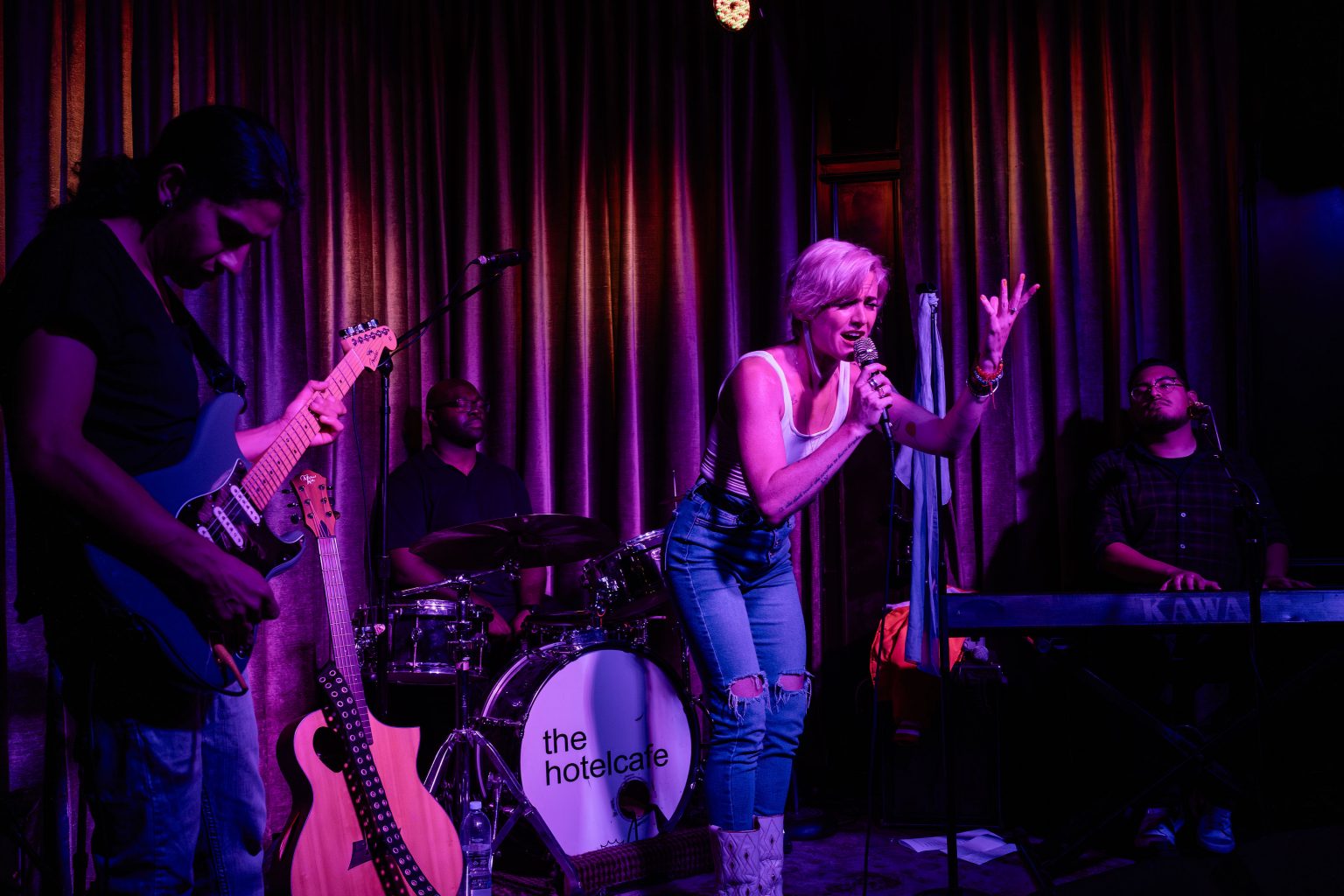
However, Hawkins’s musical journey is far from effortless. Amid personal challenges and adversity, she weaves her personal odyssey of pain and pleasure, transforming these experiences into empowering anthems.
In a candid interview with the Blade, Hawkins spoke with profound openness and vulnerability about her past struggles with opiate and heroin addiction: “That was 10 years ago that I struggled with opiates,” she shared. Yet, instead of letting her previous addiction define her, Hawkins expressed to the Blade that she harbors no shame about her past. “My newer music is much more about empowerment than recovery,” she explained, emphasizing that “writing was the best way to process trauma.”
Despite her struggles with addiction, Hawkins managed to recover. However, she emphasizes that this recovery is deeply intertwined with her spiritual connection to nature. An illustrative instance of Hawkins’ engagement with nature occurred during the COVID pandemic.
Following an impulse that many of us have entertained, she bought a van and chose to live amidst the trees. It was during this period that Hawkins composed the music for her second EP, titled “Lead with Love.”
In many ways, Hawkins deep spiritual connection to nature has been profoundly shaped by her extensive travels. Born in San Diego, spending her formative years in Massachusetts, and later moving to Tennessee before returning to Southern California, she has broadened her interests and exposed herself to the diverse musical landscapes across America.
“Music is the only thing I have left,” Hawkins confides to the Blade, highlighting the integral role that music has in her life. This intimate relationship with music is evident in her sultry and dynamic compositions. Rather than imitating or copying other artists, Hawkins effortlessly integrates sounds from some of her favorite musical influences to create something new. Some of these influences include LP, Lucinda Williams, Lana Del Rey, and, of course, Amy Winehouse, among others.
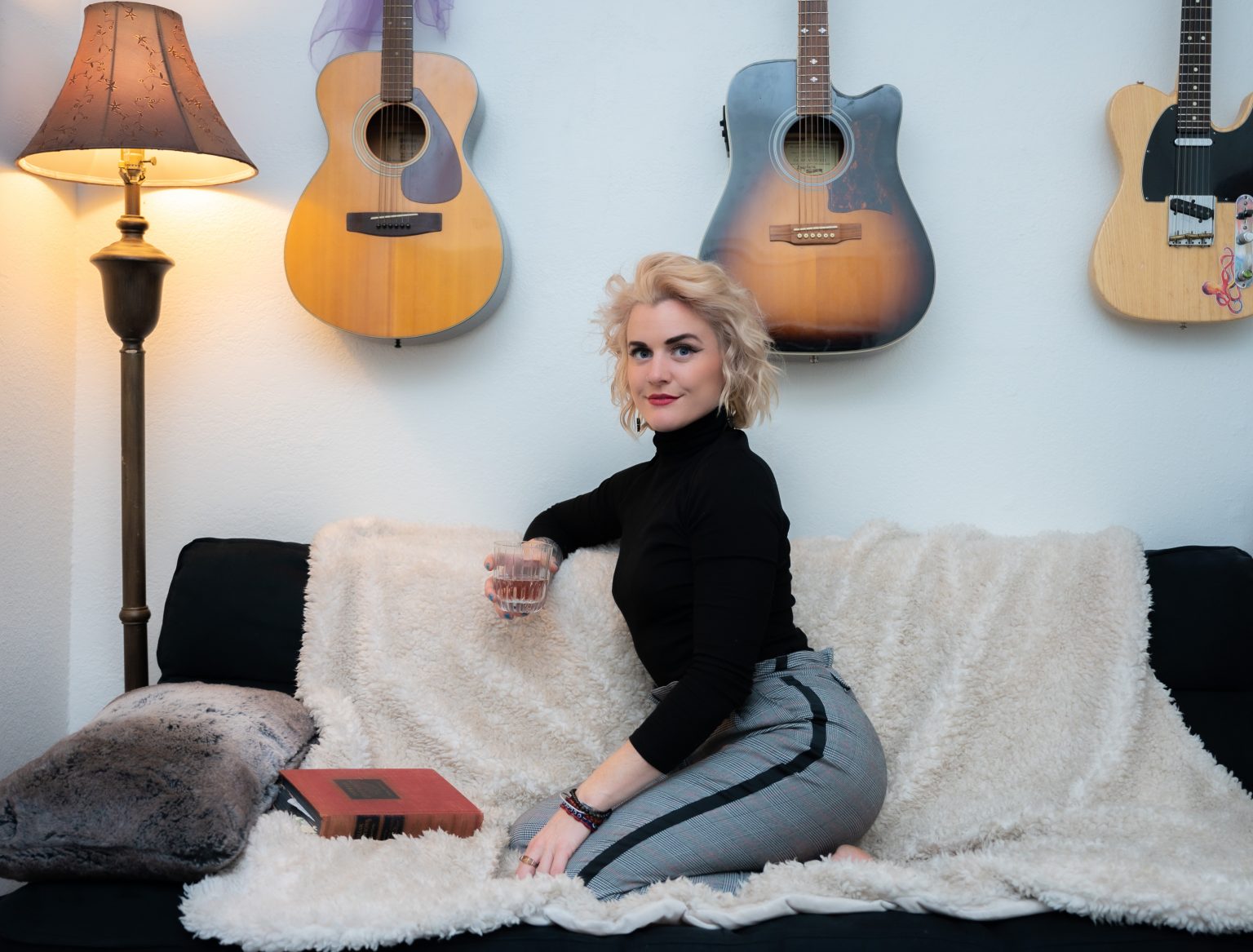
Hawkins has always been passionate about music—-she began with piano at a young age, progressed to guitar, and then to bass, eagerly exploring any instrument she could get her hands on. However, instead of following a traditional path of formalized lessons and structured music theory, Hawkins told the Blade that she “has a hard time following directions and being told what to do.”
This independent approach has led her to experiment with various genres and even join unexpected groups, such as a tribute band for Eric Clapton and Cream. While she acknowledges that her eclectic musical interests might be attributed to ADHD, she holds a different belief: “Creative minds like to move around.”
When discussing her latest musical release — “Stay True (the live album)” which was recorded in a live studio setting — Hawkins describes the experience as a form of improvisation with both herself and the band:
“[The experience] was this divine honey that was flowing through all of us.” She explains that this live album was uncertain in the music’s direction. “For a couple of songs,” Hawkins recalls, “we intuitively closed them out.” By embracing creative spontaneity and refusing to be constrained by fear of mistakes, the live album authentically captures raw sound, complete with background chatter, extended outros, and an extremely somber cover of Ozzy Osbourne’s “Crazy Train” coupled with a slow piano and accompanied strings.
While “Stay True” was a rewarding experience for Hawkins, her favorite live performance took place in an unexpected location—an unattended piano in the middle of an airport. As she began playing Beethoven’s “Moonlight Sonata”, Hawkins shared with the Blade a universal connection we all share with music: “This little girl was dancing as I was playing.”
After the performance, tears welled in Hawkins’ eyes as she was touched by the young girl’s appreciation of her musicianship. Hawkins tells the Blade, “It’s not about playing to an audience—it’s about finding your people.”
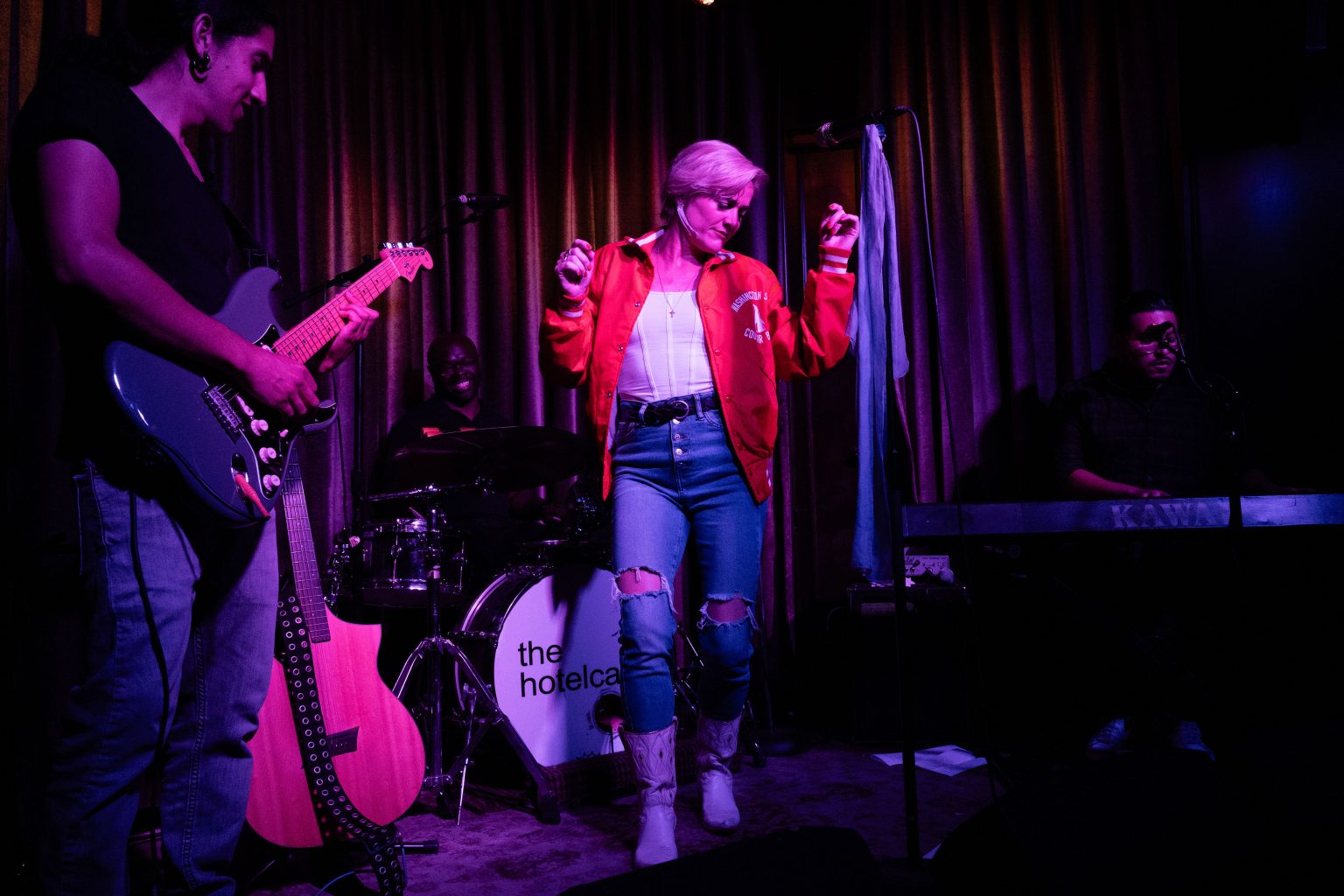
What sets Hawkins apart as an artist is her ability to connect with her audience in diverse settings. She highlights EDC, an electronic dance music festival, as a place where she unabashedly lets her “freak flag” fly and a place to connect with her people. Her affinity for electronic music not only fuels her original pop music creations, but also inspires her to reinterpret songs with an electronic twist. A prime example of this is with her electronic-style cover of Tal Bachman’s 90’s hit, “She’s So High.”
As an openly queer woman in the music industry, Hawkins is on a mission to safeguard artistic integrity. In songs like “My Father’s Men,” she bares her vulnerability and highlights the industry’s misogyny, which often marginalizes gender minorities in their pursuit of artistic expression.
She confides to the Blade, “The industry can be so sexist, misogynist, and oppressive,” and points out that “there are predators in the industry.” Yet, rather than succumbing to apathy, Hawkins is committed to advocating for gender minorities within the music industry.
“Luckily, people are rising up against misogyny, but it’s still there. ‘My Father’s Men’ is a message: It’s time for more people who aren’t just white straight men to have a say.”
Hawkins is also an activist for other causes, with a fervent belief in the preservation of bodily autonomy. Her self-directed music video “I’ll play Daddy,” showcases the joy of embracing one’s body with Hawkins being sensually touched by a plethora of hands. While the song, according to Hawkins, “fell upon deaf ears in the south,” it hasn’t stopped Hawkins from continuing to fight for the causes she believes in. In her interview, Hawkins encapsulated her political stance by quoting an artist she admires:
“To quote Pink, ‘I don’t care about your politics, I care about your kids.’”
When Hawkins isn’t writing music or being a champion for various causes, you might catch her doing the following: camping, rollerblading, painting, teaching music lessons, relaxing with Bernie (her beloved dog), stripping down for artsy photoshoots, or embarking on a quest to find the world’s best hollandaise sauce.
But at the end of the day, Hawkins sums up her main purpose: “To come together with like-minded people and create.”
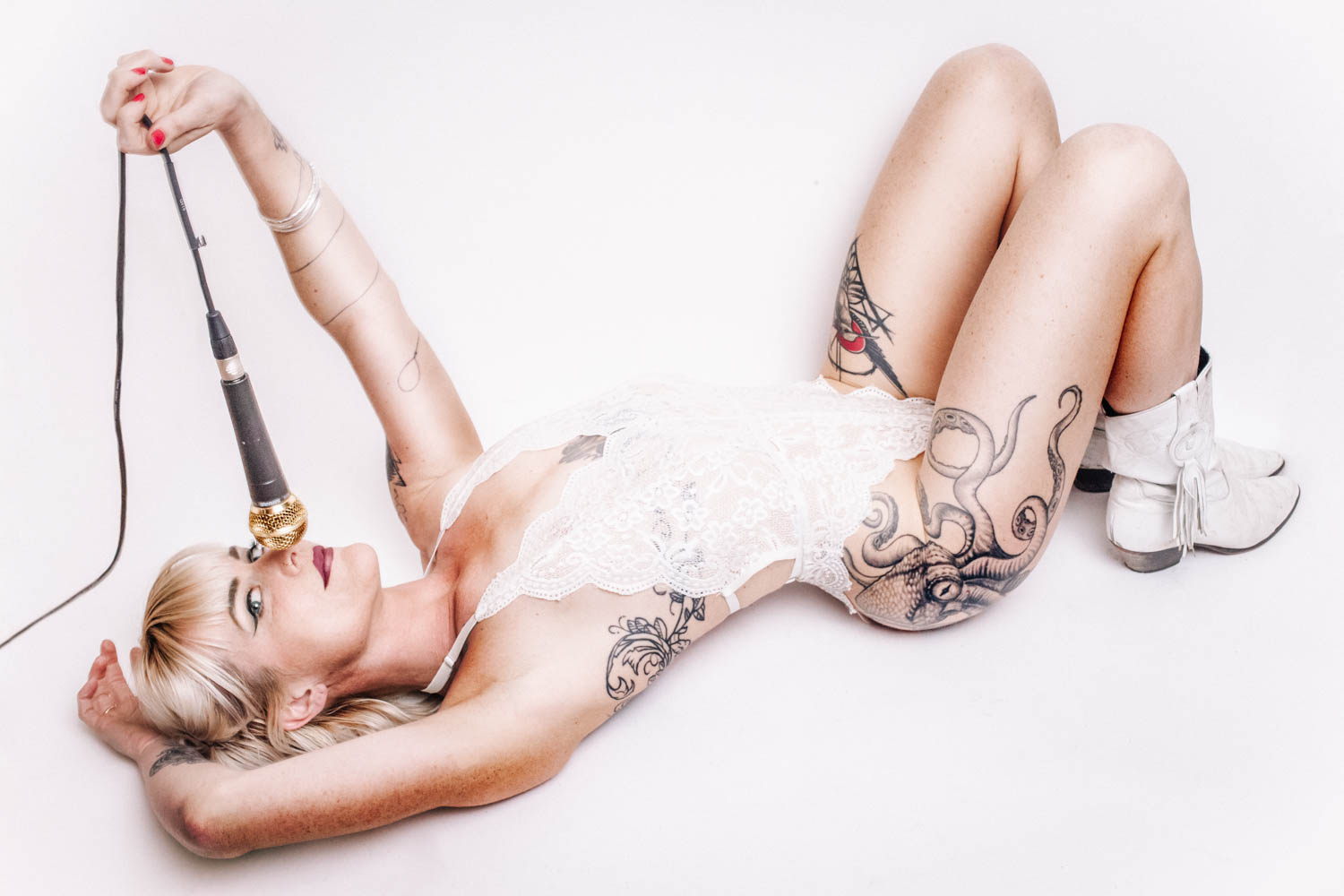
Part of this ever-evolving, coming-of-age-like journey includes an important element: plant-based medicine. Hawkins tells the Blade that she acknowledges her previous experience with addiction and finds certain plants to be useful in her recovery:
“The recovery thing is tricky,” Hawkins explains, “I don’t use opiates—-no powders and no pills—but I am a fan of weed, and I think psilocybin can be helpful when used at the right time.” She emphasizes the role of psychedelics in guiding her towards her purpose. “Thanks for psychedelics, I have a reignited sense of purpose … Music came naturally to me as an outlet to heal.”
While she views the occasional dabbling of psychedelics as a spiritual practice, Hawkins also embraces other rituals, particularly those she performs before and during live shows. “I always carry two rocks with me: a labradorite and a tiger’s eye marble,” she explains.
-

 District of Columbia3 days ago
District of Columbia3 days agoCatching up with the asexuals and aromantics of D.C.
-

 State Department5 days ago
State Department5 days agoState Department releases annual human rights report
-

 South America3 days ago
South America3 days agoArgentina government dismisses transgender public sector employees
-

 Maine4 days ago
Maine4 days agoMaine governor signs transgender, abortion sanctuary bill into law

